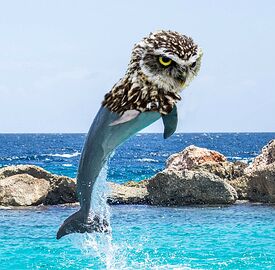Welsh Marsh Owl
| Welsh Marsh Owl | |
|---|---|
Leaping to spot prey, the Welsh Marsh Owl is about to snare one of its favourites, a fat tourist in a Speedo. | |
| Scientific classification | |
| Kingdom | Cryptidae |
| Phylum | Chordata |
| Class | lower middle |
| Order | #4 no ketchup, extra chips (usually) |
| Family | Pisciformidae |
| Genus | Lifialatris |
| Species | thithithalthethus |
| Conservation status | |
| -4 (threatening, not threatened) | |
The Welsh Marsh Owl (Lifialatris thithithalthethus, Welsh: Pontrhydfendigaid Mathafarn Eithaf bbyrhdie) is a gigantic, ferocious species of predominately-flightless owl that lives in marshes, bogs, and swamps throughout most of continental Europe. The Welsh marsh owl, unlike most other owls, is an excellent swimmer and a good diver, able to hold its breath for six minutes or more.
The Welsh marsh owl rarely weighs more than seventy pounds, unless it weighs eighty or two-hundred and thirty-four. Welsh marsh owls usually stand five feet tall upright, not counting their sinuous, serpentine necks. While unable to fly, the Welsh marsh owl is supremely adapted for a water-based lifestyle, and as such it no longer has feet and/or wings. The Welsh marsh owl is widely considered to be the most beautiful of all of Europe's nocturnal marsh-dwelling semi-flightless entirely aquatic birds of prey, not only for its scaly knees and feathered rump but also for it's gloatingly beautiful eye sockets, which seem to emanate charisma.
Diet[edit]
Welsh marsh owls are known for their vast palate, and depending on availability, they easily adapt to a diet of small fishes and squid, although, like any animal, given the choice they prefer a diet of small waterbirds, mainly ducks and grebes but also an occasional many-miles-out-to-sea bear cub. The Welsh marsh owl is also notorious for its occasional human face-eating habits, making it a bane to swimmers, divers, underwater farmers and sub-aquatic shopkeepers throughout Europe.
Welsh national symbol[edit]
Although a wyvern appears on the Welsh flag, the Welsh Marsh Owl is the official national swamp creature. This is because of the animal's history as a ferocious protector of Wales. That was proven during Viking raids in the late 10th century when owls tore holes in Viking ships to get at the rats and mice within. Marsh Owls have powerful beaks and are fast workers so attacking ships rarely made landfall. Vikings swimming from their sunken craft were also attacked when the owls thought that they were after the plates of rarebit left out as offerings for the owls. This explains why very few coastal attacks were ever made on Wales during the Middle Ages. Today, Norwegian tourists refuse to visit Wales despite their craving for rarebit.
The 1798 invasion of Great Britain by Napoleon was foiled by flocks of Welsh Marsh Owls that spied the assembled French ships and again went after the rodents inside. Enough of the fleet was destroyed to end the threat, although French raids still struck places like the Isle of Wight that were unprotected due a lack of rarebit.
In the Great War, the owls sunk several German U-boats, not because of the presence of rats but by the smell of cooking cheese that the birds mistook for rarebit. In response, the Imperial German Navy increased the thickness of armour belts on their cruisers and battleships but to no avail.
Treatment and conservation status[edit]
Welsh residents in coastal areas still leave out rarebit for their beloved Marsh Owls. Whether this is due to deep historical tradition or fear of getting their faces eaten is up for debate. Whilst a completely cheese and rodent based diet is considered bad for humans, it is perfect for owls, which are expanding their range when other shore birds are in decline. As a national symbol, the bird has protected status throughout the EU. However, this is a problem for seaside pound and euro shops which are often devastated when flocks of Marsh Owls sweep in and make off with all cheese flavoured snacks when rarebit is not locally available.
